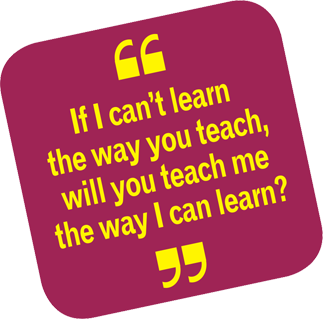As a professional working in the education system, you will be aware of the growing need to understand, assess and treat Dyslexia. Mysore University estimates a percentage of between 3 and 10% of the population of India has Dyslexia (Ramaa S: Two decades of research on learning disabilities in India. Dyslexia 2000, 6(4):268-283) Not only is the need vast but the availability of teachers is very low.
So, what can we do for you now that you are visiting our site? What specific questions do you have?
- What is the formal definition of Dyslexia?
- How do I know if my student has Dyslexia?
- What training or continuing education is available?
- What are some good research articles on Dyslexia, specific to India?
- What job opportunities do I have in the sector of Specific Learning Disability?
What is the formal definition of Dyslexia?
Dyslexia is a specific learning disability that is neurological in origin.
It is characterized by difficulties with accurate and/or fluent word recognition and by poor spelling and decoding abilities. These difficulties typically result from a deficit in the phonological component of language that is often unexpected in relation to other cognitive abilities and the provision of effective classroom instruction. Secondary consequences may include problems in reading comprehension and reduced reading experience that can impede growth of vocabulary and background knowledge.
Adopted by the IDA Board of Directors, Nov. 12, 2002.This Definition is also used by the National Institute of Child Health and Human Development (NICHD), USA.
Studies show that individuals with Dyslexia process information in a different area of the brain than do those who do not have Dyslexia.
People who have Dyslexia are of average to above average intelligence.
How do I know if my student has Dyslexia?
We outline below some of the common indications of Dyslexia. It is important to understand that development varies from child to child, and every child will probably display a few of these difficulties. Any child displaying a cluster of these indicators should be assessed by a competent professional.
Preschool
- Speaks later than most children
- Pronunciation problems
- Difficulty rhyming words
- Slow vocabulary growth, often unable to find the right word
- Trouble learning the alphabet, numbers, days of the week, colours, shapes
- Extremely restless and easily distracted
- Trouble interacting with peers
- Difficulty following directions
- Fine motor skills slow to develop
Pre-Primary - Primary
- Slow to learn the connection between letters and sounds
- Confuses between basic words (hot/cold, up/down)
- Makes consistent reading and spelling errors including letter reversals (b/d, p/q) and inversions u/n, m/w; transpositions/inversions (felt/left, from/form) and substitutions (house/home)
- Transposes number sequences and confuses computation signs (+, -, x, /, =)
- Slow to remember facts
- Slow to learn new skills, relies heavily on memorisation
- Impulsive, difficulty with planning
- Trouble learning about time
- Unstable pencil grip
- Poor co-ordination, unaware of physical surroundings, prone to accidents
Middle School
- Frequently reverses the sequence of letters and/or words (was/saw, tops/spot, ‘You are how?’ for ‘How are you?’)
- Slow to learn prefixes, suffixes, root words, and other spelling strategies
- Avoids reading aloud
- Trouble with word problems
- Difficulty with handwriting
- Awkward, fist-like, or tight pencil grip
- Avoids writing compositions
- Slow or poor recall of facts
- Difficulty making friends
- Trouble understanding body language and facial expressions
High School
- Continues to spell incorrectly, frequently spells the same word differently in a single piece of writing
- Avoids reading and writing tasks
- Trouble summarising
- Trouble with open-ended questions on tests
- Weak memory skills
- Difficulty adjusting to new settings
- Works slowly
- Poor grasp of abstract concepts
- Either pays too little attention to details or focuses on them too much
- Misreads information
General Warning Signs
- Short attention span/unable to concentrate: not able to pay attention long enough to finish an activity
- Restless or hyperactive: moves around constantly; fidgety; doesn't seem to move with a purpose in mind; picks on other children
- Does not complete tasks; careless, unorganized approach to activities: does not finish what is started; does not seem to plan to get work done
- Listening difficulties; does not seem to understand: has trouble following directions; turns away while others are talking; does not seem interested
- Avoids participation with other children or only knows how to play by hurting others: stays away from other children; always plays alone; does not participate in group activities; bites, hits or bullies other children
- Resistant to discipline or direction (impertinent, defiant, resentful, destructive, or negative): does not accept directions or training; disagreeable; hard to manage; destroys materials or toys deliberately; temper tantrums
- Speech problems:
- Unusually fast or slow speech
- Articulation: difficulty making clear speech sounds.
- Stuttering: difficulty with flow of speech; repeating sounds, words, or phrases; blocking words or sounds
- Voice: unusually loud, soft, high or low; scratchy or hoarse quality
- Physical complaints: talks of being sick or hurt; seems tired or without energy
- Temperamental, overly sensitive, sad, irritable: moody, easily depressed, unhappy, shows extreme emotions and feelings
What training or continuing education is available?
MDA conducts a number of short training workshops and programmes throughout the year, with a view to providing opportunities for continuing education for professionals working in the field. These programmes (listed below) include training in the use of a number of tried and tested remedial and assessment tools used at our Centres.
*The Pass Reading Enhancement Programme (PREP)
*The Feuerstein Instrumental Enrichment Programme (FIE)
*The Sonday System
*The Dyslexia Therapist Training Programme
Further information about these training programmes can be found in the 'Workshops and Training Programmes' section on our website.
What are some good research articles on Dyslexia relevant to India?
* Mismatch negativity in children with Dyslexia speaking Indian languages (Behavioral and Brain Functions 2007, 3:36doi:10.1186/1744-9081-3-36) written by Vanaja Chittinahalli Shankarnarayan and Sandeep Maruthy, Department of Audiology, All India Institute of Speech and Hearing, Mysore, India
* Modes of genetic transmission of Dyslexia in south Indian families (Indian Journal of Human Genetics 2005:Vol 11:Issue 3:Page 135-139) written by Saviour P, Ramachandra Department of Studies in Zoology, University of Mysore, Manasagangothri, Mysore-570006, India
* The effects of extended time on algebra test scores for college students with and without learning disabilities. (Journal of Learning Disabilities) 1997 Mar- Apr: 30():222-7 written by Alster EH, Gavilan College, Gilroy, CA 95020, USA.
* MCAT Court Ruling




